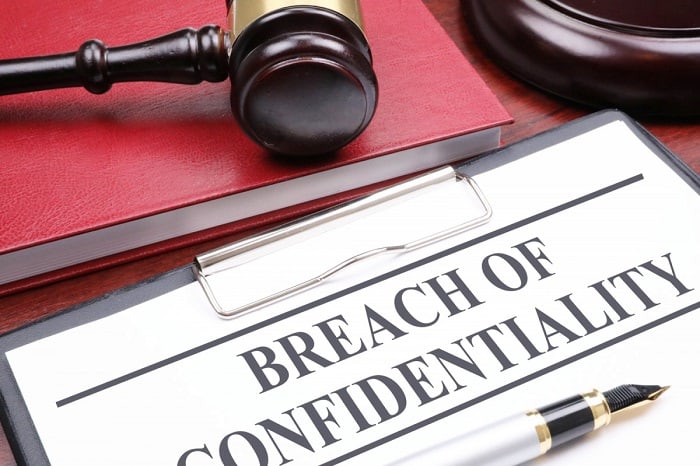Table of Contents

Breach of Confidence
Nothing is more gut-wrenching than finding out confidential company information has been made available to your competitors or the public. Here’s everything you need to know to protect your confidential information and act upon breaches of confidentiality.
The business-critical nature of confidential data
Data is the backbone of modern businesses because it provides direct insight into the status of your business. The information could include industry and customer knowledge, company financials and strategy, human resource matters, or virtually any other information used in decision-making.
Information not only provides an understanding of measures for product improvement but can also be analyzed to increase the odds of market success. Protection of your business information is crucial to establish a better stance than your competitors. Thus, the maintenance of confidentiality in business proceedings is vital for your business’s survival.
Provided this information is acquired by a party that could exploit it, leakage of information could lead to the detriment of your business. It could reveal your internal secrets, the working mechanisms, or even weaponize your competitors. To prevent such circumstances, businesses can claim the protection of information that it deems confidential or sensitive through NDAs, confidentiality agreements, and even cease and desist orders. Such protections provide a legal remedy that businesses could seek in the case of a Breach of Confidence.
When does a Breach of Confidence Occur?
Generally, the following criteria are necessary to claim a breach of confidence:
- The information in question should possess the quality of confidence. For information to hold a quality of confidence, it should not be of public knowledge. The leakage of such information would act against the interest of your enterprise.
- The information must be conveyed to a recipient alongside the obligation of confidence. To recognize whether there is an obligation to confidence, the subject matter of the information should be taken into account. Provided, the information serves a limited purpose and any reasonable person would recognize that the information is confidential, it is assumed that the person conveying or receiving the information should maintain confidence.
- The information that is leaked should be used in a wrongful or “unauthorized” manner. When the information is used for any other purpose that deviates from the original intent of the conveyer, and if it is done without authority, it is considered a breach of confidence.
How can you establish an obligation for confidentiality?
If you are conveying sensitive information concerning your business to a third party or an employee, the safest way to do so is by creating an obligation to confidentiality. You may do this either by contract or by agreement.
In the contract or the agreement, you should clearly outline the details entailing the information that is confidential and the applicability of the obligation of confidentiality. You should also outline the extent to which the information may be used by the recipient of the confidential information. For instance, you could mention the purpose for communication of that information and what act or omission comprises violations.
If there are specific restrictions about how the information may be used or conveyed, it is wise to mention them in the agreement or contract. Finally, the time for the applicability of confidentiality obligations ought to be mentioned. It is helpful to state whether the confidence ought to be maintained in perpetuity or until a specified time.
Establishing an obligation of confidence for the recipient of information through an agreement or contract not only increases the chances of them abiding by it, but also makes your claim stronger in case of a breach.
Consequences of Breach of Confidentiality
In case the recipient fails to maintain the confidentiality of the information conveyed to them, it results in a violation of contractual responsibilities. If you are in a situation where someone has breached the obligation of confidence pre-disposed to them, you can seek legal remedies. If they hold sensitive information and are likely to share it, you can seek the court’s assistance to prevent it based on a breach of trust. Provided your claim has weightage over the opposing party, the court could issue an order to prevent misuse of your information.
If you have received a piece of confidential information and are not contractually bound to protect such information, you should exercise caution. Even when you have not signed a written contract that explicitly outlines the obligation of confidentiality, the right of the conveyer to have their information protected from leakage to third parties is implicit. Unless your circumstances are unique and the information is of public knowledge, you may be held liable in court for breach of confidential information.
How to Claim a Breach of Confidentiality?
Breach of Confidentiality can be claimed in court, however, the claim is contingent on:
1. The Quality of Information in Question
2. The circumstance of Impartation of Information
If your claim is strong, you can seek remedies for the breach of confidence.
Remedies for Breach of Confidentiality:
1. Issue a Cease and Desist Letter:
You can understand a Cease and Desist Letter as a warning to stop conducting a certain act. You can provide a notice to a company or an individual to refrain from conducting a certain action.
The notice states the legal actions you will take provided they fail to comply. It is helpful to send a cease and desist letter when you do not want to amplify a situation but sternly express your interests. You could also clarify the legal misconduct of the recipient. You could make the notice more efficient by specifying a deadline for response.
Oftentimes, the escalation of conflict can be prevented through a warning notice. Additionally, it could save the time and cost that would otherwise take to resolve the matter in court.
2. Sue for Damages:
If your company has suffered a large financial loss or damage to reputation through a breach of confidence, alternative remedies would not be as effective. If you are in this circumstance, suing for damages is your best option.
In the case, you choose to sue, and the court decides in your favor, you may have four viable remedial outcomes: Injunction, Account of Profits, Damages, and Constructive Trust.
An injunction is similar to a cease and desist letter- the difference being it bears the authority of the court. It could order the prevention of the further disclosure of sensitive information, its usage, or both. The defendant is legally bound to follow an injunction.
Account of Profits awards you an equitable remedy. This is only applicable in cases where the person you are suing has benefitted or is likely to benefit from leaking or inappropriately using your confidential information.
Damages award you with compensation for the loss that has resulted from the breach of confidence.
The confidential trust comprises the profits of the breach of confidence acquired by the individual who has committed the breach. The overall and subsequent benefits of the breach are provided to the plaintiff.
3. Seek Mediation:
Mediation is an extra-judicial Alternative Dispute Resolution method. Mediation is a less formal method of dispute resolution.
A professional trained in the field of conflict resolution acts as a mediator between conflicting parties.
Mediation is observed to be advantageous because it is quicker and cost-effective and it allows both parties to discuss issues that would not be addressed in a legal setting. If you have experienced a breach of confidence but do not want to take strict legal action, mediation is your best option.
Furthermore, mediation can help you to draft a resolution that is mutually beneficial to both parties.
Defenses for the Claim of Breach of Confidentiality
Arguing that there was a “Just Cause” for the disclosure or breach is not a viable defense.
If you have conducted a breach of Confidence, the defense of conscience is your best argument against the plaintiff’s claims. In other words, you have to present to the court that the breach has occurred due to circumstances outside your control and that your intentions were not to cause harm to the plaintiff.
Conclusion
Breach of Confidence occurs when a party that holds sensitive confidential information discloses it with mal-intent. It can be extremely detrimental to businesses. Therefore, creating an obligation of confidence while disclosing sensitive information is crucial for the protection of information. In case, the breach has already occurred, you may seek mediation, send cease and desist notice or sue for damages.
You may also like:
- Cease and Desist Notice
- Cease and Desist Letter Template
- Confidentiality Agreement (NDA)
- Non Disclosure Agreement (NDA)
- What is constructive dismissal?
Raveena Rani
Raveena is a seasoned International IP Counsel with a unique blend of engineering and legal acumen, specializing in Intellectual Property, Technology Law, and Corporate Transactions. She has extensive experience drafting and negotiating NDAs, commercial agreements, and legal documents in the areas of M&A, SaaS, and AI. Her global perspective is complemented by hands-on internships, corporate counsel roles, and mentoring initiatives. She thrives at the intersection of law, business, and technology.






